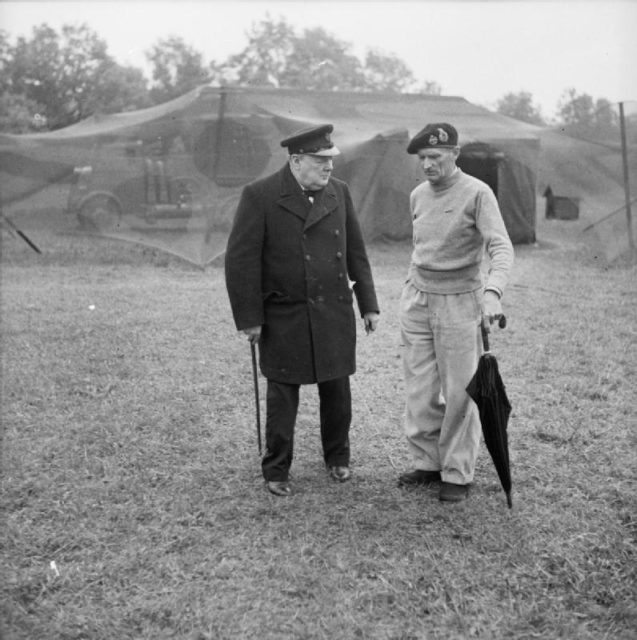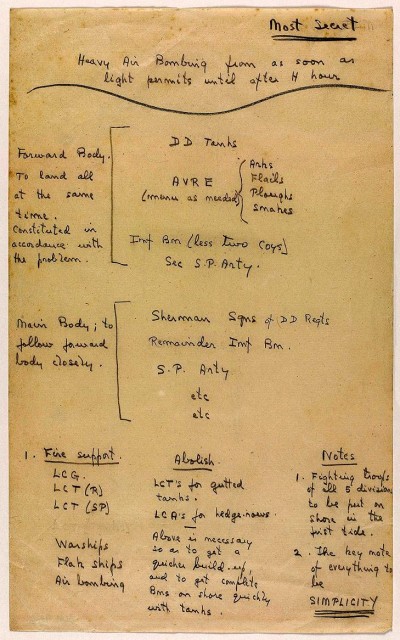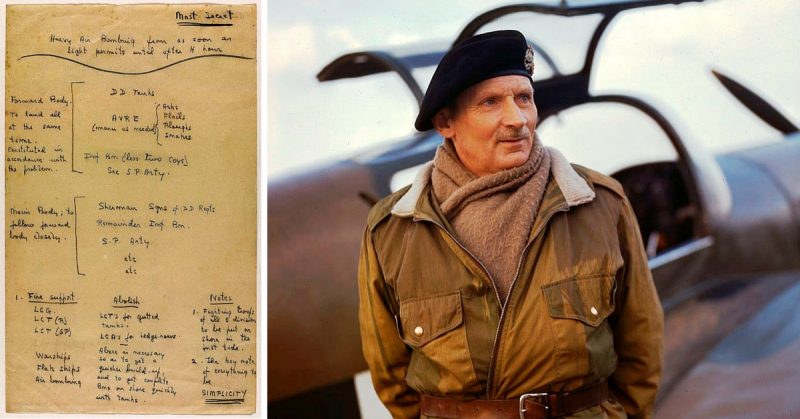The D-Day invasion was one of the most complex military operations ever undertaken. 160,000 troops crossed the English Channel in one day, with support from hundreds of warships and planes.
General Montgomery was assigned to command the 21st Army Group which consisted of all Allied ground forces that would take part in Operation Overlord, under the overall direction of the Supreme Commander, American General Dwight D. Eisenhower.
The Imperial War Museum has released General Bernard Montgomery’s battle plan for that day. It fits, surprisingly, on a single sheet of paper. The plan, written in pencil, has “Most Secret” written at the top. At the bottom is written: “The key note of everything to be SIMPLICITY.” In between is the breakdown of armed forces into sections and lists the special armored vehicles used by the first troops ashore.

The release of the document commemorates the 72nd anniversary of the invasion, which took place on June 6th, 1944.
Also released was a handwritten draft of General Montgomery’s speech to the troops. The speech was read out loud by officers to their men just before the operation. Alan Moorehead was one of the journalists who heard Montgomery speak, as he did after every formal inspection of troops:
‘I wanted to come here today so that we could get to know one another: so that I could have a look at you and you could have a look at me – if you think that’s worth doing.
We have got to go off and do a job together very soon now, you and I, and we must have confidence in one another. And now that I have seen you I have complete confidence… complete confidence… absolutely complete confidence. And you must have confidence in me.’
That was the beginning. For a hundred yards all round him row after row of young upturned faces, an atmosphere of adolescent innocence and simplicity. They sat on the grass keeping utterly still lest they should lose a word.
‘We have been fighting the Germans a long time now,’ Montgomery went on. ‘A very long time… a good deal too long. I expect like me you are beginning to get a bit tired of it… beginning to feel it’s about time we finished the thing off.
And we can do it. We can do it. No doubt about that. No doubt about that whatever. The well-trained British soldier will beat the German every time. We saw it in Africa. We chased him into the sea in Tunisia… then we went over to Sicily and chased him into the sea again… I don’t know if there are any more seas…’
This was the point where the soldiers relaxed and laughed. Well, it was true, wasn’t it? The Germans had been beaten in Africa. They weren’t so wonderful.
‘The newspapers keep calling it the Second Front,’ Montgomery continued. ‘I don’t know why they call it the Second Front. I myself have been fighting the Germans on a number of fronts, and I expect a good few of you have too.
They should call it Front Number Six or Front Number Seven. As long as they don’t want us to fight on Front Number Thirteen…’
Most of the tenseness had gone out of the soldiers now. Monty was all right. He didn’t talk a lot of cock about courage and liberty. He knew what it was like. And perhaps one had been taking the whole thing a bit too seriously. It wouldn’t be so bad.
Then – ‘We don’t want to forget the German is a good soldier… a very good soldier indeed. But when I look around this morning and see the magnificent soldiers here… some of the best soldiers I have seen in my lifetime… I have no doubt in my mind about the outcome… no doubt whatever. No doubt at all that you and I will see this thing through, together.’
Finally – ‘Now I can’t stay any longer. I expect some of you have come a long way to get here this morning and you want to get back.’ (Some of them had been traveling since 4 am.) ‘I just want to say good-bye and very good luck to each one of you.’ (Source)

Anthony Richards, head of documents and sound at the museum, said, “While the official nature of much of Monty’s papers has already formed the basis for historical studies of the operations in which he was involved, the opportunity now exists for people to look more closely at his personal documents and see Monty as a more human figure. The draft of his personal message shows his desire to connect directly with the troops under his command in order to inspire them.”
